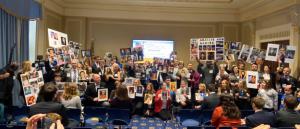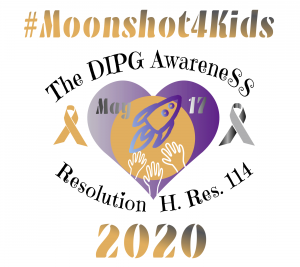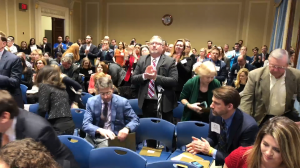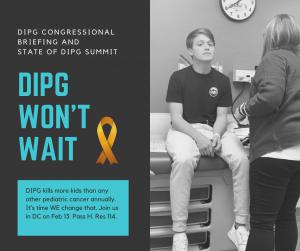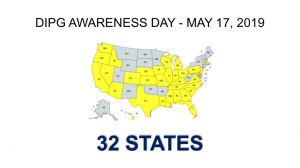Game Changer: Moonshot4Kids Congressional Briefing Brings Hope, New Research Opportunities to Pediatric Brain Cancer
World-renown experts, philanthropic organizations, biotech innovators, NIH leaders, and pediatric brain cancer families gather to brief congressional staff.
SANTA CLARITA, CA, USA, March 13, 2020 /EINPresswire.com/ -- Hopeful families of children with brain cancer from around the United States gathered together in support of a congressional briefing on February 13, 2020 in the Rayburn House Office Building in Washington, DC. The briefing, “DIPG, Pediatric Brain Cancer, and the Importance of H. Res. 114,” included a star-studded panel of world-renown experts in pediatric neuro-oncology, key entrepreneurs, dedicated philanthropists and a patient with DIPG, one of the deadliest cancers known to humankind, who all spoke in turn to the urgent need for greater awareness to the tragedy of pediatric brain cancer and the general inadequacy of the way the current medical research industry is structured to produce viable, life-saving solutions for children with cancer. In collaboration with the Office of Congresswoman Jackie Speier (D-CA-14), the event was hosted by DIPG Advocacy Group, an association of pediatric brain cancer foundations and individual childhood cancer advocates in support of House Resolution 114, the National DIPG Awareness Resolution. Its third introduction to Congress was championed by Congresswoman Speier on Feb. 8, 2019 with Congressman David Joyce (R-OH-14) amid 16 other original cosponsors, a tally today which reaches 101.
Janet Demeter, a co-founder of DIPG Advocacy Group and President of Jack’s Angels Foundation in Agua Dulce, CA, explains in her welcome and introduction the “Moonshot4Kids” branding for H. Res. 114, as it brings awareness to the fact that we as a society put a man on the moon with 1960s technology and brought him home safely because the stakes were high in the arms race, and as an important goal for humankind. Yet, despite its consistent death toll as the leading cause of cancer-related childhood mortality in the US, pediatric brain cancer, of which DIPG (diffuse intrinsic pontine glioma) is the 2nd most common type and the deadliest, has seen no significant change in the standard treatment protocol nor prognosis since Neil Armstrong’s daughter died of it in 1962. “DIPG exemplifies in a powerful way the challenges in treating pediatric cancer and the daily tragedies which ensue from the general lack of solutions our medical research industry has for deadly pediatric disease. The Resolution simply asks that we acknowledge this so that the world-at-large will be alerted to this urgent, unmet need.”
Because of the #Moonshot4Kids Briefing and the attention brought to pediatric brain cancer and specifically to the deadliest types, brainstem gliomas like DIPG and DMG (diffuse midline glioma), communication between the scientists of the Pacific Pediatric Neuro-Oncology Consortium (PNOC), and the Children’s Brain Tumor Tissue Consortium (CBTTC) and the leadership at NIH have led to suggestions for a novel SPORE grant proposal for pediatric brain cancer currently being organized by PNOC and CBTTC and for which support letters are being solicited throughout the childhood cancer community. This new approach came directly from conversations addressing the specific challenges of conducting pediatric brain cancer research, the need for greater institutional and global collaboration, and the current lack of corresponding grant-issuing and regulatory policies at the federal level. In retrospect of the event Demeter explains, “by simply acknowledging the fact that pediatric cancer research has been consistently underserved by the medical research system and by clearly identifying the specific challenges it represents, we create opportunities for the future success of all involved...better collaborative science, better investment, and urgently needed therapies getting to these children. Awareness works.”
The morning of February 13, Demeter welcomed the panel and briefing audience and shared briefly her personal motivation to advocacy through the experience of losing her son, Jack, to DIPG in 2012, and the importance of H. Res. 114: “[It] is a simple House Awareness Resolution, representing the attempt of a downtrodden, bereaved community to ask our representatives in Congress to help raise public awareness to an issue of great urgency but which has no voice, as most of the children die and most families are too devastated to speak out. Forty years ago, leukemia was a death sentence...but because we targeted it, and called it out by name, we’ve made great progress with most types of leukemia, mostly from research on adult leukemias with protocols successfully translated for children, prompting many to assert that 4 out of 5 children survive cancer. The hidden story here is that most exclusively pediatric cancers are deadly, marginalized as rare, as they all have relatively small patient populations, and have too few solutions, if any, designed specifically for these children.”
The first expert to present was Dr. Sabine Mueller, leading scientist of PNOC and Director of the DIPG/DMG Centre of Excellence at University Children’s Hospital Zurich, who attested to the dismal clinical reality of DIPGs universally fatal prognosis. She spoke to the need for greater world-collaboration, and to the desire of most every doctor who cares for these children, “so that there will be a day in the near future when I can say to families, ‘This used to be an incurable disease, but through true collaboration we now have effective therapies...'" Dr. Adam Resnick from Children’s Hospital Philadelphia (CHOP) and leading scientist at CBTTC spoke to the value of pediatric brain cancer research and the opportunity it represents as, "the beachhead from which our community can innovate on the required infrastructure, technologies and resources that will drive bold and much needed change in how discovery and impact can be newly empowered and coordinated across all pediatric cancer patient communities," and added, "But we need more hands in the fight, and awareness to the urgency of this need is the key to timely progress."
Equally illuminating was the testimony of Dr. Charles Keller, Scientific Director of Children's Cancer Therapy Development Institute (cc-TDI) in Beaverton, OR, who spoke to the infamous pre-clinical gap in the medical research industry otherwise known as "The Valley of Death", where often promising discoveries are not translated into therapies for children because of the lack of "investment justification", harkening back to for-profit corporate interests. Dr. Keller maintains his optimism; "...by drawing attention to the pre-clinical gap, and to the urgent need for solutions...H. Res. 114 is a straightforward mechanism to stimulating conversation, innovation and potential new cures." Josh Allen, Senior VP of Oncoceutics and inventor of ONC201, an experimental drug showing great promise, noted bluntly, "In the case of Oncoceutics, we would not have been able to discover or develop ONC201 for DIPG without government supported research. We simply would not have known about DIPG and almost every step of the discovery and development has been critically enabled by research supported by NIH and other government agency grants...how many more worthy therapeutic ideas will we read about in research journals that will remain trapped in the lab and never reach patients? I call upon you to increase support for federally funded basic, translational, and clinical research for DIPG, as suggested by House Resolution 114."
David Arons, JD, CEO of National Brain Tumor Society represented NBTS in support of this effort, as brain cancer is the leading cause of cancer-related death in children. "If there were a stronger word than urgent, it should be applied to finding a cure to DIPG...What you’re hearing from all panelists is that...we now have an actionable strategy that depends on Congress taking action to recognize and bring greater awareness to the importance of this issue.” Dr. Malcolm Smith, Associate Branch Chief, Pediatrics in the Clinical Investigations Branch NCI/NIH, who as a government employee did not take a position on H. Res. 114, informed the audience about how ongoing NIH investments have been critical to moving this field forward. “NCI is also expanding the PBTC this year...to make its clinical trials more accessible to children and families throughout the country,” he reassured families in attendance. “Please know that my colleagues and I within NIH...understand the urgency...and we look forward to continuing to collaborate with you to keep pushing this field forward as fast as we can.”
This issue of time could not have been more eloquently expressed and more befitting of Jace Ward, a 20 year old pre-law student at Kansas State University, who was diagnosed with DIPG on May 17, 2019. "I can’t promise I’ll be back here next year...while we have been 'waiting' to take a solid stand, DIPG has been taking the sight, the hearing, the speech, the ability to swallow and eventually the breath of thousands of kids across this country." Jace's testimony was central to the event as Janet Demeter gave both Jace and his mother Lisa Ward JD, strong credit to having inspired the event, as the threat of the ONC201 trial shutting down last summer resulting from a lack of production funds could have meant that Jace might not have lived to see the day of the briefing. It was a testament to the collaborative efforts of families and foundations to keep the trial going, most notably to Amanda Haddock of DragonMaster Foundation, who wrote timely articles on Medium.com and rallied her forces on Facebook. “Jace’s willingness to be a voice for DIPG, his caring for the many little children who have gone before him and lost their lives, was an example of immeasurable grace, poise, and selflessness. He knows what he’s up against, and he knows how lucky he is to have found ONC201 when he did,” Demeter notes today as she explains the quest for a hearing (officially launched by DIPG Advocacy Group in late October 2019) before the Health Subcommittee, for Jace, which ultimately manifested as this historic Congressional Briefing on pediatric brain cancer and DIPG, responsible for a significant portion of the annual childhood cancer death toll.
On the note of a hearing turned briefing, so much buzz and interest was created upon the DIPG community's learning of the event, that the scheduled reception was literally turned into a Summit: "The State of DIPG", held at the offices of Covington and Burling in Washington DC that afternoon, hosted by the Michael Mosier Defeat DIPG Foundation. Families, advocates, more research scientists and experts came together to discuss the subject matter in greater detail. Families who had only known each other on Facebook met with tears of joy, and patients on the ONC201 trial could meet its inventor, Josh Allen.
In the final "Parent Voices" section of the briefing, Jenny Mosier of Defeat DIPG Foundation in Bethesda, MD, shared a bit of trepidation in following Jace Ward but was no less powerful in the testimony of her son Michael’s DIPG journey, which ended on May 17, 2015. The Mosier family’s commitment to raising awareness to this terrible disease has resulted in 32 States declaring a May 17 DIPG Awareness Day in 2019, and the coalescing of the DIPG community around that day as reflected in the National DIPG Awareness Resolution. Elizabeth Psar, co-founder of DIPG Advocacy Group and President of Julia Barbara Foundation in Knoxville, TN, spoke powerfully of the power of education and the awareness that a national day could bring to save lives. “Brain cancer is the pink elephant in the living room no one wants to talk about. Armed with knowledge from our events in Knoxville, friends and extended family have helped others discover pediatric brain tumors before it was too late.” Finishing the section of Parent Voices was Cam and Jill Morin (Luke’s Posse, Denver CO) with their daughter Phebe; their sweet son Luke died just 17 days after his DIPG diagnosis in 2018. Truly, they were horrifically robbed; "One day he was fine, the next we were told he was going to die and there was nothing we could do about it. Nothing."
The last presenter was a surprise video submission by Dr. Michelle Monje of Stanford University, who validated her precursors points and brought them home to a single thought: “Progress forward has come only from a collaborative effort…by those who have seen this disease...and could not turn away from this urgent, unmet need. How much larger the effort would be, how much quicker we would find effective therapies if more people were aware, and more people and resources joined us in this fight.” The event closed with families coming to the front of the briefing room holding up pictures representing the many children who have died of DIPG, and the many families who were not able to be present. Demeter called for Members of Congress to "be resolved" to make a difference, and that the passage of the Resolution would in its power bestow hope upon pediatric brain cancer, all with a simple signature of support.
"Looking ahead, this unique SPORE grant opportunity with NCI is truly ground-breaking in that it's a multi-institutional grant, which is unprecedented for NIH, and also for pediatric brain cancer! We've been heard; this is the only path forward for pediatric research--immense collaboration and innovation. We have the technology, we have the resources. The world just needs to know how urgently we need help."
For a complete synopsis of the #Moonshot4Kids Congressional Briefing with transcripts, summaries, quotations, and video footage, and information about the SPORE grant proposal for CBTTC and PNOC, visit www.dipgadvocacy.org.
Janet Demeter
Jack's Angels Inc
+1 661-977-3125
email us here
Visit us on social media:
Facebook
Twitter
LinkedIn
Jace Ward, #Moonshot4Kids Congressional Briefing, Feb. 13, 2020 in Washington DC
Legal Disclaimer:
EIN Presswire provides this news content "as is" without warranty of any kind. We do not accept any responsibility or liability for the accuracy, content, images, videos, licenses, completeness, legality, or reliability of the information contained in this article. If you have any complaints or copyright issues related to this article, kindly contact the author above.

